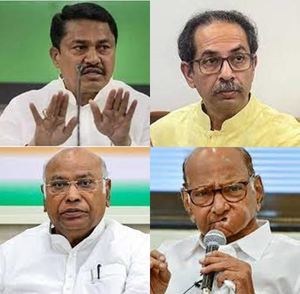Mumbai: The election year 2024 has dawned and all political parties in the country are busy sharpening their knives, poring over permutations-combinations, mulling strategies and coining slogans for the upcoming much-anticipated Lok Sabha polls.
All political parties — whether ruling or in the Opposition, at the Centre or in the states — are earnestly gearing up and aiming for ‘fateh’ (victory) at all costs.
Ditto in Maharashtra, where the ruling MahaYuti of Shiv Sena-Bharatiya Janata Party-Nationalist Congress Party (AP) & the Opposition Maha Vikas Aghadi (MVA) alliance of the Congress-Shiv Sena (UBT)-Nationalist Congress Party (SP), plus, their respective smaller allies/partners, are all set to pounce at each other and win.
Maharashtra with the second highest number of 48 Lok Sabha seats, just next to the BJP-ruled Uttar Pradesh (80), is a crucial state for the national opposition INDIA bloc.
The Congress has ruled the state for nearly 50 years after its founding in May 1960, with the non-Congress alliances ruling thrice from1995-1999, 2014-2019, and now since June 2022 after the MVA was toppled.
However, despite brave assertions from the MVA top leaders like Sharad Pawar, Uddhav Thackeray, Nana Patole that “All’s Well”, the three parties have yet to announce their proposed ‘seat-sharing’ formula – almost like the INDIA bloc.
Much to the delight of the MahaYuti, the MVA partners continue to squabble over the 48 seats, with other contenders like Vanchit Bahujan Aghadi (VBA) waiting outside for their share.
A peculiar scenario has emerged where the SS-UBT and Congress are demanding around 23-24 seats each, the NCP(SP) has not floated any figures yet, while the VBA is staking claim to at least 12 seats.
The SS-UBT claims and calculations are based on its victory in 2019 as the undivided Shiv Sena, but Congress leaders argue that now a majority of the originally elected MPs have joined the Shiv Sena of Chief Minister Eknath Shinde.
Countering this, the SS-UBT pointed out that in 2019, the Congress bagged only 1 Lok Sabha seat while the NCP (SP) won 4.
Congress leaders hit back by saying that the SS’s vote share for the 18 seats it won was 23.5 percent, compared with Congress’ 16.4 percent (1 seat, Chandrapur), and the undivided NCP’s 15.7 percent (4 seats).
However, the Congress-NCP hold a grouse that in many constituencies, the erstwhile alliance of VBA with the All India Majlis-e-Ittehadul Muslimeen purportedly cut into their votes in several constituencies with a 7 percent vote share though it won just a single seat (AIMIM) in Chhatrapati Sambhajinagar (then, Aurangabad).
Naturally, the VBA-AIMIM alliance and certain other local forces which bagged a 9.6 percent vote share, hurt the Congress-NCP badly and boosted the BJP-led saffron alliance’s performance.
Although the NCP (SP) is optimistic that the VBA led by Prakash Ambedkar may be accommodated in the INDIA bloc, the state and central Congress leaders harbour serious doubts and distrust about the proposal.
As the MVA-INDIA bickering on seat-sharing continues, Maharashtra BJP president Chandrashekhar Bawankule has confidently set an ambitious target to bag “at least 45 of the 48 Lok Sabha seats” along with its allies, amid sneers from the Opposition.
Despite just one seat, the Congress hopes to drive a tough bargain as the two major partners the SS-UBT and NCP(SP) are faded images of their original self after they suffered vertical splits in June 2022 and July 2023, respectively.
Nevertheless, the Opposition parties are uncomfortably together, and Congress state president Patole has set a target to win at least 35 seats along with the SS-UBT and the NCP (SP).
The MVA seat share arrangement is likely to be announced later in January, most probably after the INDIA announcement, according to a state Congress bigwig.
Meanwhile, the three allies keep popping up tentative formulae for the 48 seats: the Congress 18, NCP-SP and SS-UBT 15 each, or 16 seats each for the three top partners, or 15 each with 3 seats left for smaller allies (like the VBA or Swabhimani Shetkari Sanghatana), or a similar arrangement without leading to political bloodshed and keeping the allies united.
Fortunately, in recent days, the partners privately indicate a climbdown with words like ‘realistic’ demands for seats, setting ‘achievable’ targets and adopting an ‘inclusive’ attitude towards the smaller/weaker partners in the MVA or even accommodating other parties like the VBA.
Despite the obvious stumbling blocks hinting at disunity, most leaders are positive that the mature top leaders like Sharad Pawar, Thackeray and Congress president Mallikarjun Kharge will work out an amicable formula soon – well before the Election Commission sets the poll ball rolling.
(Quaid Najmi can be contacted at q.najmi@ians.in)
–IANS


Comments are closed.